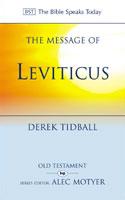OLD TESTAMENT The Message of Leviticus (The Bible Speaks Today) by Derek Tidball (Leicester: IVP, 2005). Some parts of the Bible have always been more taxing for interpreters than others. Leviticus has something of a reputation as a difficult book to read, so we must be grateful to Derek Tidball for writing this thorough and lucid exposition of it. It is a challenge to work through Leviticus and to try and make sense of it, understanding how it is God-breathed and useful for today. I had many questions and issues after doing it again recently and on many of them Tidball is very helpful in showing the way. This is no surprise since he is an experienced writer and has already completed another commentary on this book in the Crossway Bible Guides series. Tidball is excellent in helping us to see the different contexts into which Leviticus fits. He does not go from a text in Leviticus straight to Jesus but spends time trying to understand its context within the book first, as well as the Pentateuch, which some sermons I have heard on Leviticus fail to take account of altogether. He thinks through knotty theological issues and addresses them, outlining and assessing alternative theological interpretations as he does so while engaging major commentators, both Jewish and Christian. He is usually sane in his applications, rejecting views which feed our fancy with their creativity and imagination rather than feeding our hearts in adoration (as he puts it). That is not always the case; I found the suggestion that “the mildew that was embedded in the homes of people who had settled in the promised land is representative of the sin embedded in the institutions of our society” perhaps a little fanciful, though that is not to say we shouldn’t think through structural or institutionalized sin. Other applications are more helpful and rooted in the text. On homosexuality in Leviticus 18 he advocates the traditional interpretation in quite definite language as “the plain meaning… straightforward… obvious” and has little time for special pleading which attempts to circumvent such verses. Comparing contemporary penal codes to the Old Testament he writes that “One cannot help but feel that the emphasis on restitution, at least, would lead to a great improvement in the current system of sentencing.” On tithing he suggests, “the tithe should probably be regarded as the minimum a Christian should give”; and on several occasions he counters the arguments of those who dislike substitutionary atonement, at one point labelling their view “extraordinarily shallow.” I was edified by the plethora of applications which were addressed to ministers (e.g. on seriousness in our task, on not making ministry an idol, on ministerial pay). I found some of his comments on chapter 8 somewhat inconsistent and difficult to reconcile with other parts of the book; for instance, he refers to ministers as “standing in the gap” today as Moses and Aaron did, but in several other places he is quite clear that Christian ministers are not priests so this did not quite compute for me. Elsewhere the remarks can perhaps be a little tendentious, as when he applies parts of chapter 10 to say that “there was room for two godly people, both qualified in the law, and both handling it with perfect integrity, to see it differently. However precise its stipulations, there were always going to be areas where there was freedom to interpret it one way or another.” Nevertheless, generally speaking Tidball’s exegesis is well founded and his application carefully worked through a biblical-theological grid which sees Christ as the fulfilment of the law. On a final note, I am left slightly puzzled as to why this book had to be so long. At 327 pages and 23 chapters (to Leviticus’ 27) it is perhaps a trifle verbose and could have benefited from some judicious editing in places, especially compared with Barry Webb’s excellent BST on Isaiah which somehow manages to treat 66 chapters of text in far fewer (252) pages. Of course, Leviticus is a neglected book we want to recover for Christian preaching and teaching. But will we preach it in this much depth? Anyone you know planning to do a 23-part series in Leviticus soon? If not, if it would be pastorally wiser in most churches to cover larger swathes of the text or simply edited highlights in a shorter series of sermons, then that will require having to read much longer sections of this book for it to function as a useful guide. Still, there’s much here to chew on and praise God for. A shorter book may be more helpful as a guide to preaching Leviticus, but that is not the stated aim of a Bible Speaks Today book anyway, is it? This review also appeared in Churchman 122/3 (2008). |
